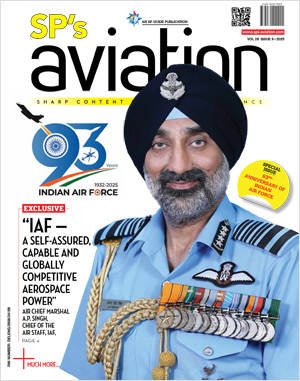INDIAN ARMED FORCES CHIEFS ON OUR RELENTLESS AND FOCUSED PUBLISHING EFFORTS

The insightful articles, inspiring narrations and analytical perspectives presented by the Editorial Team, establish an alluring connect with the reader. My compliments and best wishes to SP Guide Publications.

"Over the past 60 years, the growth of SP Guide Publications has mirrored the rising stature of Indian Navy. Its well-researched and informative magazines on Defence and Aerospace sector have served to shape an educated opinion of our military personnel, policy makers and the public alike. I wish SP's Publication team continued success, fair winds and following seas in all future endeavour!"

Since, its inception in 1964, SP Guide Publications has consistently demonstrated commitment to high-quality journalism in the aerospace and defence sectors, earning a well-deserved reputation as Asia's largest media house in this domain. I wish SP Guide Publications continued success in its pursuit of excellence.
49 per cent FDI by foreign airlines

News
In a landmark decision aimed at allowing infusion of funds from foreign airlines to ailing Indian carriers, the government has paved the way for permitting foreign direct investment (FDI) up to 49 per cent. The Cabinet will have to approve this major policy shift as, of now, foreign airlines are not permitted any stake in Indian carriers. The Civil Aviation Minister Ajit Singh said, “The aviation industry is under a lot of stress,” meaning it needs financial support. Currently, FDI up to 49 per cent and investment by NRIs up to 100 per cent is allowed on the automatic route, but no FDI by foreign airlines in Indian carriers is permitted.
Views
The timing of the decision to permit FDI up to 49 per cent by foreign carriers into airlines in India, a move held up for long on account of political compulsions and unfounded security concerns, could not have been more opportune. Despite the impressive annual growth rate in the airline industry at an average of 17 per cent, with the exception of one, all the other airlines are incurring losses and desperately need infusion of funds. As airlines are finding it difficult to raise working capital locally, FDI certainly appears to be a viable option and an easy way out of the morass. However, FDI would be truly beneficial to the industry and the nation if it is accompanied by reciprocity aimed at mutual benefit.
Yet to be finally cleared by the government, the proposal in respect of foreign direct investment (FDI) of 49 per cent, up from 24 per cent initially suggested by the Ministry of Civil Aviation and 26 per cent as recommended by the Department of Industrial Policy and Promotion, will come as a lifeline to the industry. The industry is currently struggling to survive in a hostile operating environment plagued with rising price of fuel, airport and other charges amongst the highest in the world, weakening of the Indian rupee, huge debt repayment liabilities, mounting losses and fierce competition. Financial distress of airlines has been compounded as financial institutions in India are not willing to extend support to the loss-making carriers. The decision, however, symbolises fulfillment of the commitment to the private airlines by the Indian Prime Minister about two months back to “look into their financial difficulties”. Although FDI in the airline industry will provide fresh avenues for overall upgrade in technology and operational capability, it is somewhat surprising that there is lack of unanimity amongst the private carriers themselves on this issue. Also significant is the fact that the decision by the government comes in the face of opposition to FDI in other sectors of the economy such as in retail trade.
The rapidly growing airline industry and the enormous potential the relatively untapped Indian market has to offer, should present a lucrative opportunity for investment by foreign carriers seeking to penetrate the Asian markets and to acquire the status of a global airline. As per initial indications, reputed international carriers such as Etihad Airways, Singapore Airlines, Air Asia and British Airways are likely to be the first to invest. However, given the high levels of debt of airlines, staggering cumulative losses and prospects of speedy turnaround being somewhat remote, foreign carriers may not rush in as quickly with funds as would normally be expected. With several Indian carriers teetering on the verge of bankruptcy, a major part of their investment would be used for clearing debts and compensating for cumulative losses. Besides, the state of affairs with the global airline industry itself is also not too inspiring financially. As such, it may be a difficult decision for them to tread into an uncertain, highly competitive and price sensitive Indian market where fares are often depressed below cost. Also, airlines would perhaps be more willing to invest if they have control over the operations of the airline, a facility that FDI limit of 49 per cent may preclude.





